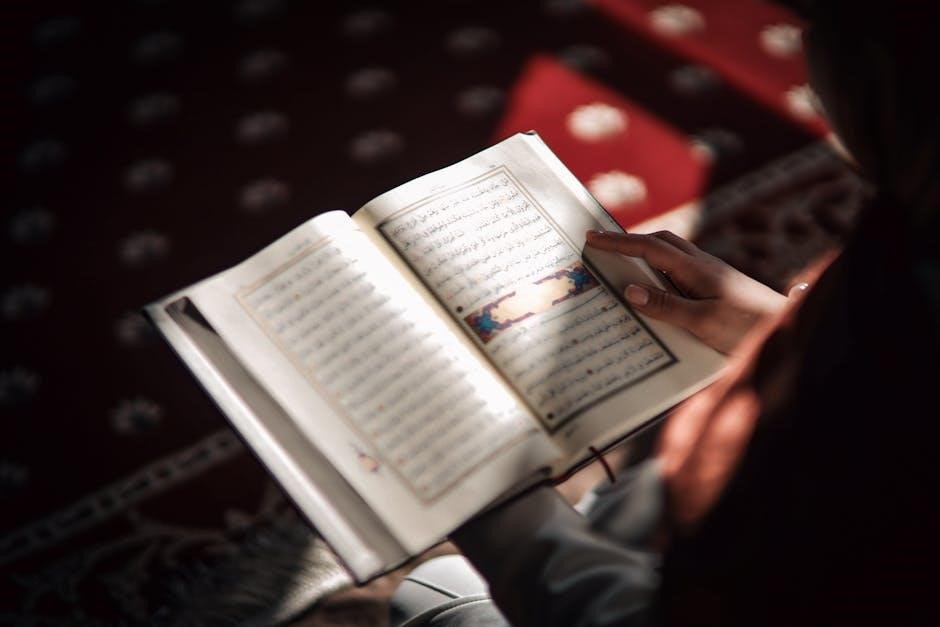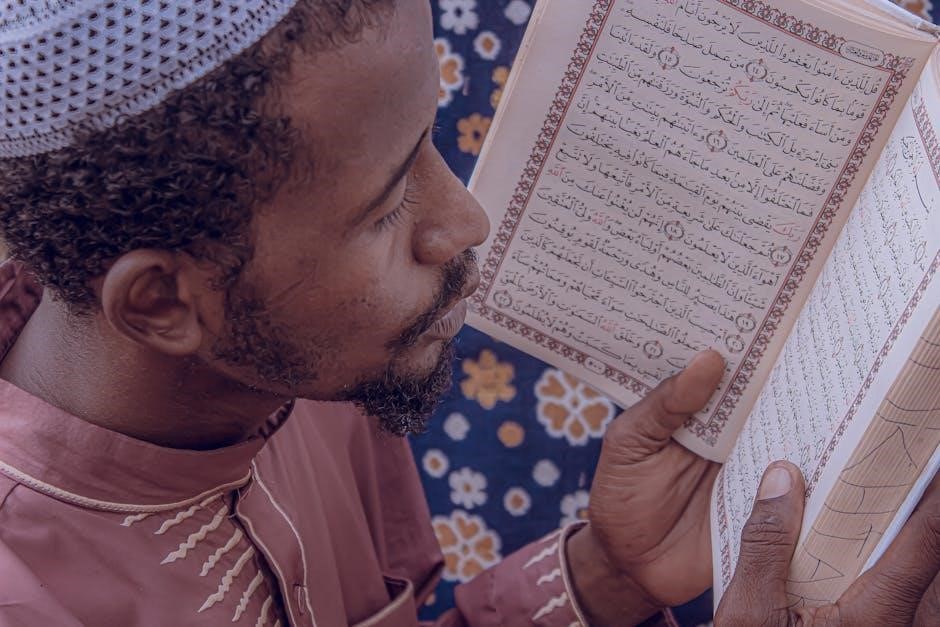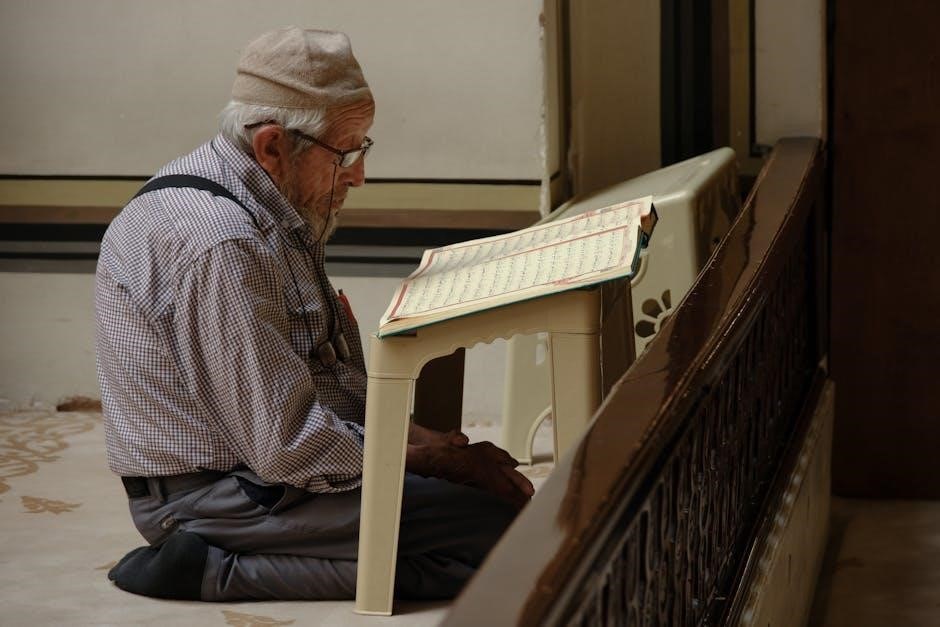A brief illustrated guide to understanding Islam provides an overview of its core beliefs‚ practices‚ and the significance of the Quran in Muslim life.
1.1. What is Islam?
Islam is a monotheistic faith emphasizing submission to Allah (God). It teaches belief in one God‚ the prophethood of Muhammad‚ holy books‚ angels‚ and the afterlife. Rooted in the Arabic word Islam‚ meaning “submission‚” it guides followers to live righteously through the Five Pillars and the Quran’s teachings‚ fostering peace‚ justice‚ and compassion in personal and societal life.
1.2. The Five Pillars of Islam
The Five Pillars are the foundation of Islamic practice‚ guiding believers in their faith. They include the Shahada (faith declaration)‚ Salah (daily prayers)‚ Zakat (charity)‚ Sawm (fasting during Ramadan)‚ and Hajj (pilgrimage to Mecca). These pillars unite Muslims globally‚ fostering spiritual growth and a sense of community‚ while emphasizing submission to Allah and living a righteous‚ compassionate life according to Islamic teachings.
The Holy Quran
The Holy Quran is Islam’s sacred text‚ believed to be the word of God as revealed to Prophet Muhammad‚ guiding believers in justice‚ compassion‚ and righteousness.
2.1. The Significance of the Quran in Islam
The Quran is Islam’s most sacred text‚ revealed in Arabic to Prophet Muhammad‚ serving as a divine guide for worship‚ ethics‚ and law. It is recited in prayers‚ ceremonies‚ and is central to Islamic rituals. Muslims view it as the literal word of God‚ providing wisdom‚ moral guidance‚ and shaping daily life and decision-making. Its teachings inspire spiritual growth‚ justice‚ and compassion‚ influencing Islamic culture and scholarship profoundly.
2.2. Key Themes and Teachings of the Quran
The Quran emphasizes the oneness of God‚ justice‚ compassion‚ and accountability. It teaches moral guidance‚ respect for prophets‚ and the balance between faith and action. Themes include belief in the afterlife‚ ethical living‚ and the importance of community. Its teachings inspire personal reflection‚ social harmony‚ and spiritual growth‚ forming the foundation of Islamic values and practices for individuals and societies alike‚ fostering peace and righteousness.
The Life of Prophet Muhammad (Peace Be Upon Him)
Prophet Muhammad‚ born in Mecca‚ received revelations from Allah‚ guiding humanity. His teachings emphasize compassion‚ justice‚ and submission to God‚ shaping Islamic values and practices globally;
3.1. Early Life and Prophethood

Prophet Muhammad was born in Mecca around 570 CE. Orphaned early‚ he was raised by his uncle and known for honesty. At 40‚ he received his first revelation from Allah through Angel Gabriel‚ marking the beginning of his prophethood and the revelation of the Quran‚ which guides Muslims to this day.
3.2. His Teachings and Legacy
Prophet Muhammad taught compassion‚ justice‚ and equality‚ emphasizing the oneness of God. His legacy includes the Quran and Hadith‚ guiding moral conduct. He promoted education and unity‚ transforming Arabia and beyond. His teachings fostered a global Islamic community‚ shaping art‚ science‚ and culture‚ leaving a profound impact on history and inspiring millions to follow his righteous path.
Islamic Art and Architecture
Islamic art and architecture are renowned for their geometric patterns‚ intricate calligraphy‚ and iconic structures like mosques and palaces‚ reflecting Islamic principles and cultural influences.
4.1. Characteristics of Islamic Art

Islamic art is distinguished by its geometric patterns‚ intricate calligraphy‚ and arabesque designs. It often avoids figurative imagery‚ emphasizing harmony and symmetry to reflect divine unity. These elements are prominently featured in mosques‚ palaces‚ and other architectural marvels‚ showcasing Islamic cultural and spiritual values through visual and decorative expressions.
4.2. Famous Islamic Architectural Marvels
Iconic structures like the Taj Mahal‚ Blue Mosque‚ Alhambra‚ and Dome of the Rock exemplify Islamic architecture. These marvels feature intricate domes‚ minarets‚ and arches‚ blending cultural influences with Islamic design principles. They reflect the spiritual and artistic brilliance of Islamic civilization‚ attracting global admiration and serving as symbols of faith and heritage.

Muslim Traditions and Practices
Muslim traditions and practices center around the Five Pillars of Islam. Daily rituals like prayer‚ charity‚ and fasting during Ramadan foster spiritual growth and community unity.
5.1. Daily Prayers and Rituals
Daily prayers‚ performed five times a day‚ are central to Muslim life. Facing Mecca‚ believers recite the Quran and perform specific physical gestures‚ fostering spiritual mindfulness. Rituals like ablution ensure purity before prayer‚ reflecting Islam’s emphasis on both physical and spiritual devotion. These practices strengthen faith and create a sense of community among followers worldwide.
5.2. Celebrations and Holy Days
Eid al-Fitr and Eid al-Adha are Islam’s major celebrations. Eid al-Fitr marks Ramadan’s end with feasting and charity‚ while Eid al-Adha commemorates Ibrahim’s sacrifice. Ramadan itself is a holy month of fasting and reflection‚ with Taraweeh prayers and Quran recitation. These events strengthen community bonds and spiritual renewal‚ fostering gratitude and unity among Muslims worldwide.
Understanding Jihad
Jihad‚ meaning “struggle” in Arabic‚ refers to the internal and external efforts to follow Allah’s path. It encompasses personal spiritual growth and collective efforts for justice and faith.
6.1. The Concept of Jihad in Islam
Jihad‚ an Arabic term meaning “struggle‚” refers to the effort to live according to Allah’s will. It encompasses both the Greater Jihad—internal spiritual struggle—and the Lesser Jihad‚ which includes defending faith and community. While military defense is a part of Jihad‚ it is governed by strict ethical guidelines. Jihad emphasizes the pursuit of justice‚ righteousness‚ and self-improvement in all aspects of life.
6.2. Misconceptions and Modern Context
Misconceptions about Jihad often stem from its association with violence. However‚ Jihad primarily refers to the internal spiritual struggle to follow Allah’s path. In the modern context‚ extremist groups misrepresent Jihad to justify violence‚ but this does not reflect its true Islamic meaning. Understanding Jihad requires distinguishing between its ethical‚ spiritual dimensions and its misuse by radical ideologies that distort Islamic teachings.

Islam in the Modern World
Islam in the modern world involves navigating contemporary challenges‚ fostering interfaith dialogue‚ promoting balanced understanding‚ and addressing misconceptions to integrate Islamic values in diverse societies globally.
7.1. Challenges Facing Muslims Today
Muslims today face challenges such as discrimination‚ misconceptions‚ and balancing tradition with modernity. These issues require fostering understanding and dialogue to address stereotypes and promote inclusive societies globally.
7.2. Islam and Interfaith Dialogue
Islam encourages interfaith dialogue to foster mutual understanding and respect. By engaging in open conversations‚ Muslims and people of other faiths can address misconceptions and build bridges. Islamic teachings emphasize coexistence and peace‚ providing a foundation for constructive dialogue. Education and collaboration are key to promoting harmony and addressing global challenges together.

Converting to Islam
Converting to Islam involves declaring the Shahada‚ embracing Islamic beliefs‚ and following its practices. Guidance and support from Muslim communities ease the transition to this transformative journey.
8.1. The Process of Conversion
Converting to Islam involves declaring the Shahada‚ the statement of faith‚ in front of witnesses. This act signifies acceptance of Islam’s teachings and commitment to its principles. The process begins with understanding Islamic beliefs‚ often guided by resources like A Brief Illustrated Guide to Understanding Islam‚ ensuring a well-informed decision. Community support and mentorship are essential for new converts navigating their spiritual journey.
8.2. What to Expect as a New Muslim
As a new Muslim‚ expect a transformative spiritual journey. You’ll embrace daily prayers‚ fasting during Ramadan‚ and community bonding. Challenges may arise‚ but support from the Muslim community and resources like A Brief Illustrated Guide to Understanding Islam will guide you. Embrace patience‚ learning‚ and growth as you navigate your new faith‚ fostering a deeper connection with Allah and His teachings.

Frequently Asked Questions
This section addresses common questions about Islam‚ such as its core beliefs‚ practices‚ and misconceptions‚ providing clarity for those seeking to understand the faith better.
9.1. Common Misconceptions About Islam
Many misconceptions surround Islam‚ such as the belief that it promotes violence or oppresses women. These stereotypes often stem from misinformation or cultural misunderstandings. Islam‚ like other religions‚ emphasizes peace‚ justice‚ and equality. The concept of jihad‚ often misunderstood as holy war‚ primarily refers to the internal struggle against sin. Islamic teachings also uphold the dignity and rights of women‚ debunking notions of inherent oppression.
9.2. Answers to Key Questions
Key questions about Islam often revolve around its core beliefs and practices. Islam is a monotheistic faith centered on submission to Allah‚ guided by the Quran and the teachings of Prophet Muhammad. Common inquiries include the significance of the Five Pillars‚ the role of women‚ and the concept of Jihad. These questions are addressed through authentic Islamic texts and scholarly interpretations‚ providing clarity and understanding.

Resources for Further Learning
Explore recommended books‚ websites‚ and engage with Muslim communities for a deeper understanding of Islam. These resources offer valuable insights and practical learning opportunities.
10.1. Recommended Books and Websites
Discover essential books like “A Brief Illustrated Guide to Understanding Islam” by I. A. Ibrahim and “The Quran” translated by Yusuf Ali. Websites such as islam-guide.com and maqamatblueprint.com offer comprehensive resources. These tools provide insights into Islamic teachings‚ history‚ and practices‚ helping deepen your understanding and connection with the faith.
10.2. Engaging with Muslim Communities
Engaging with Muslim communities enriches your understanding of Islam. Attend local mosque events‚ join Islamic courses like those on maqamatblueprint.com‚ and participate in interfaith dialogues. Listening to Muslim voices and sharing experiences fosters mutual respect and deeper insights into Islamic traditions and daily life‚ helping you build meaningful connections and a more inclusive perspective.




